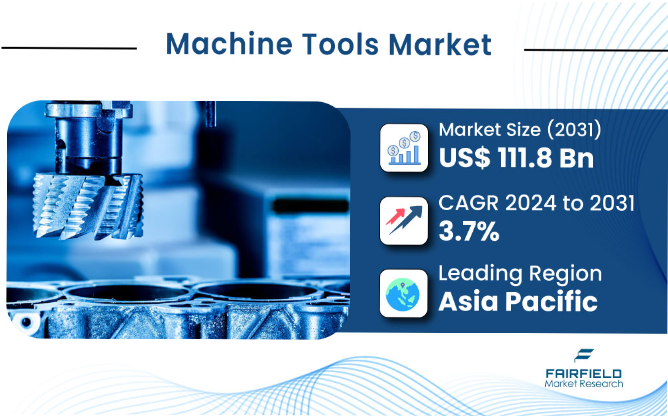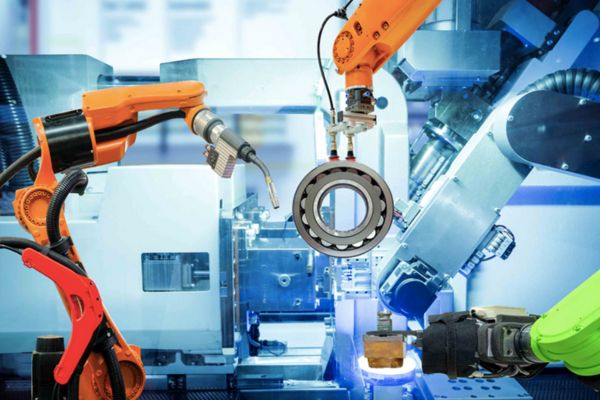Machine tools have long been at the heart of industrial manufacturing, enabling precise shaping and machining of materials to produce components that fuel a wide range of industries. With advancements in technology, modern machine tools have become more sophisticated, versatile, and efficient, playing a pivotal role in driving innovation and productivity across sectors. This blog explores the transformative role of advanced machine tools in today’s industry, their key features, and how they are shaping the future of manufacturing.
The Machine Tools Market, valued at $80 billion in 2022, is projected to grow at a CAGR of 6.5% through 2030, driven by advancements in CNC technology, IoT integration, and automation. Fairfield Market Research highlights key applications in aerospace, automotive, and medical manufacturing, emphasizing the demand for precision and efficiency. Sustainability initiatives cut material waste by up to 30%, while customization and workforce productivity improvements drive adoption. Government incentives and affordable solutions support SMEs.

Revolutionizing Manufacturing with Automation
One of the most significant developments in machine tools is the integration of automation. Automated machine tools, often equipped with computer numerical control (CNC) systems, allow manufacturers to achieve unprecedented levels of precision and efficiency. CNC systems automate the control of machining tools, enabling highly accurate operations that minimize human error.
For instance, CNC milling machines can produce complex geometries that were previously unattainable through manual machining processes. These advancements not only reduce production time but also enhance product quality, making automated machine tools indispensable in industries such as aerospace, automotive, and medical device manufacturing.
Enhanced Precision and Accuracy
Precision and accuracy are critical factors in modern manufacturing. Advanced machine tools are equipped with sensors, feedback systems, and high-speed spindles that ensure superior performance. For example, five-axis machining centers enable simultaneous movement across five axes, allowing for the creation of intricate parts with exacting tolerances.
Such capabilities are crucial in industries like aerospace, where components must meet strict specifications to ensure safety and performance. By delivering consistent results, advanced machine tools significantly reduce material waste and operational costs, further boosting their appeal in the competitive manufacturing landscape.
Integration of Smart Technologies
The rise of Industry 4.0 has brought smart technologies to the forefront of machine tool development. Modern machine tools are increasingly integrated with Internet of Things (IoT) devices, enabling real-time monitoring, predictive maintenance, and data analytics. These smart tools collect and analyze data during operations, offering valuable insights that help optimize processes and reduce downtime.
For example, IoT-enabled machine tools can alert operators about potential maintenance needs before a breakdown occurs, preventing costly disruptions. Additionally, data-driven decision-making enhances resource allocation, ensuring maximum efficiency in production lines.
Sustainability in Manufacturing
Sustainability is a growing concern across industries, and advanced machine tools are playing a critical role in addressing this challenge. Modern tools are designed to consume less energy while delivering high performance, reducing the environmental impact of manufacturing processes. Features like regenerative braking systems, energy-efficient motors, and optimized cutting strategies contribute to greener production methods.
Moreover, the precision of advanced machine tools minimizes material waste, further promoting sustainability. For instance, additive manufacturing technologies integrated into machine tools allow manufacturers to build components layer by layer, using only the material required for the final product. This approach significantly reduces scrap and aligns with the principles of a circular economy.
Customization and Flexibility
The demand for customized products has grown exponentially in recent years, and advanced machine tools are well-suited to meet this trend. Modern tools offer unparalleled flexibility, enabling manufacturers to switch between production runs with minimal reconfiguration.
Multi-tasking machine tools, for example, combine milling, turning, and grinding capabilities in a single system. This versatility allows manufacturers to produce a wide range of parts on the same machine, reducing the need for multiple setups and equipment. Such flexibility is particularly valuable in industries like consumer electronics, where product designs change frequently to meet evolving customer preferences.
Improved Workforce Productivity
Advanced machine tools not only enhance manufacturing processes but also improve workforce productivity. By automating repetitive and time-consuming tasks, these tools free up skilled workers to focus on more complex and creative aspects of production. Additionally, user-friendly interfaces and advanced programming capabilities make it easier for operators to control and manage these sophisticated machines.
The integration of machine learning and artificial intelligence (AI) further enhances the usability of modern tools. For instance, AI-powered systems can optimize machining parameters in real-time, ensuring the best possible outcomes with minimal human intervention. This synergy between human expertise and machine intelligence drives overall productivity to new heights.
Challenges and Opportunities
Despite their numerous benefits, advanced machine tools present certain challenges. High initial costs can be a barrier for small and medium-sized enterprises (SMEs) looking to adopt these technologies. Additionally, the complexity of modern tools requires specialized training for operators, creating a demand for upskilling programs.
However, these challenges are accompanied by significant opportunities. Governments and industry bodies are increasingly offering incentives and support to promote the adoption of advanced manufacturing technologies. Furthermore, the ongoing development of affordable and scalable solutions is making advanced machine tools accessible to a broader range of manufacturers.
The Future of Machine Tools
The evolution of machine tools shows no signs of slowing down. As technologies like AI, robotics, and 5G connectivity continue to mature, the capabilities of machine tools will expand further. Collaborative robots, or cobots, are already being integrated with machine tools to enhance automation and improve safety in production environments.
Additionally, advancements in materials science are leading to the development of cutting tools with enhanced durability and performance. For example, diamond-coated tools and ceramic inserts are enabling faster machining speeds and extended tool life. These innovations will continue to drive the adoption of advanced machine tools across industries.

















